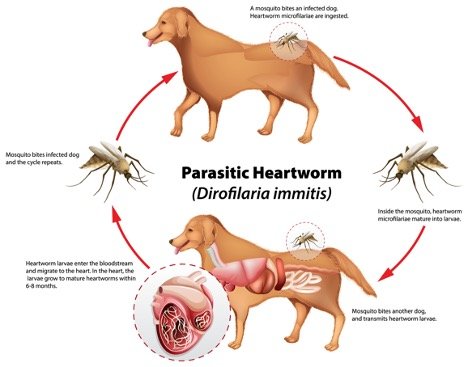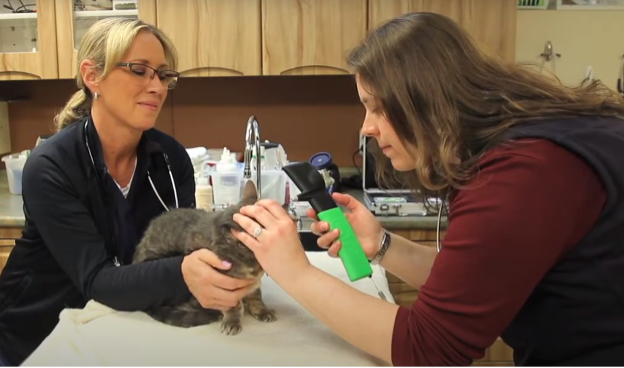Heartworm disease in dogs and cats is a serious condition that can cause severe damage to an animal’s heart, lungs, and other organs. Thankfully, effective treatments and preventative measures are available to keep your pet safe from the parasite. Learn more about heartworm symptoms, diagnosis, and treatment in dogs and cats here.
What is Heartworm Disease?
Heartworm disease is an infectious parasitic disease caused by worms living in the blood vessels of the heart and lungs of an animal. These worms reproduce and grow over time, seriously damaging the heart and other major organs. Infection most commonly affects dogs and sometimes cats. Left untreated, it results in death in pets.
The Heartworm Cycle

When a mosquito bites an animal infected with heartworms, it sucks up the microscopic heartworm larvae (microfilariae). These larvae continue to develop in the mosquito, and the mosquito deposits the parasite into its next victim.
Symptoms of Heartworm Disease
While dogs and cats can share some heartworm symptoms, symptoms can differ between species.
Symptoms in a Dog
- Mild persistent cough
- Reluctance to exercise
- Fatigue after moderate activity
- Decreased appetite
- Weight loss
Symptoms in Cats
- Difficulty or labored breathing
- Vomiting
- Decreased activity
- Loss of appetite
- Weight loss
- Convulsions
- Blindness
- Fluid in the lungs
Diagnosing Heartworm Disease
Our clinic provides various in-house diagnostic testing with the most state-of-the-art technology available. Our goal is to provide your pet with the highest care possible, and our diagnostic tools help us do that.
As part of a complete annual examination, we run a blood test that helps us detect when heartworm disease is present. If we find the presence of heartworm disease, we have a variety of diagnostic tools available that help us determine the extent of the disease and establish a treatment plan that will help your pet regain their health.
Treating Heartworm Disease in Pets
When treating heartworm disease, we consider your pet’s species, age, size, and overall health before treatment. Generally, standard treatments involve giving a series of closely monitored injections or administering oral medication over a short period. Depending on the severity of the infestation and your pet’s risk factors for developing complications, we may recommend additional testing to monitor the treatment. Regular checkups at our hospital are essential for monitoring progress and ensuring the success of a heartworm infection treatment plan.
Managing Post-Infection Symptoms
After treatment, your pet will need close monitoring to minimize the risk of further complications. Symptoms such as weight loss, weakness, and lethargy may accompany heartworm infection initially. These may persist for several weeks or months after treatment due to the inflammation and damage caused by the worms in your pet’s body. Depending on the length and severity of the infection, additional treatments may be necessary to ensure continued health post-infection. Regular checkups with your veterinarian are essential in identifying any potential risks.
Heartworm Prevention
Prevention is the best protection against heartworm disease in your dog or cat. Year-round preventive medications can help protect your pet from becoming infected with heartworms.
You can also reduce the risk of infection by avoiding areas infected with mosquitoes.
- Temporary pools and ponds created by melting snow or rain
- Floodplains along streams and riverbanks
- Irrigated fields and meadows
- Containers that hold water and fill up after a rain shower
- Tree holes that collect rainwater
Additionally, make sure you bring your pet to Fox Run Animal Hospital for regular checkups, where we can run heartworm tests on your pet so we can detect any early signs of infection.
Final Words
Heartworm is an important issue to be aware of as a pet owner, but you can take precautionary actions to protect your pet and be mindful of the symptoms of heartworm. We can work together to protect your pet from any severe or fatal consequences of the disease. Please contact us to schedule an exam or preventative treatment.
Your Friendly Team at
Fox Run Animal Hospital


